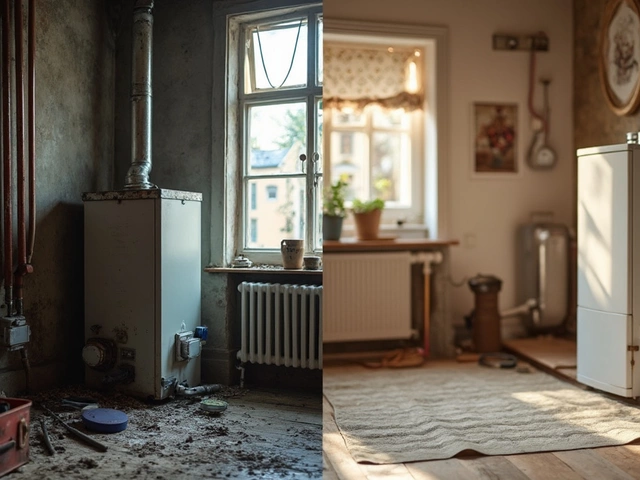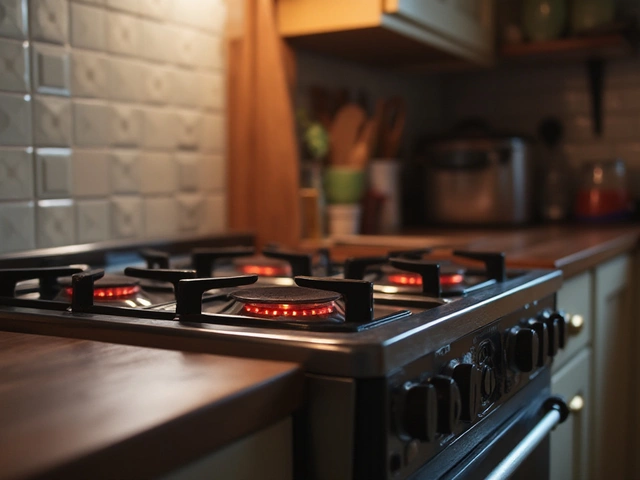Picture this: it's Sunday morning, and you're all set to whip up a delicious breakfast. But just as you try to turn on the cooker, nothing happens. Total buzzkill, right? Now you're stuck with thinking if you should call someone to fix it, or if buying a new one is the smarter move.
The truth is, whether or not to repair a cooker isn't a straightforward decision. It really depends on a bunch of factors, like how old the cooker is, how much repairing it would cost, and how frustrating that glitch is.
Let's start with the basics. First off, look for obvious signs your cooker is waving a white flag. Maybe the burner won't light or the temperature is all over the place. These aren't just a pain—they could be dangerous.
- Signs Your Cooker Needs Repair
- Age Matters: When to Walk Away
- Crunching the Numbers: Cost vs. Benefit
- Quick Fixes You Can Try at Home
- Pro vs. DIY: Making an Informed Choice
- Other Considerations: Safety and Efficiency
Signs Your Cooker Needs Repair
Ever felt like your cooker is just not listening to you anymore? It happens. Sometimes, there are pretty obvious signs that hint it's time to give your trusty appliance a little attention. But what exactly should you be on the lookout for?
First up, burners that won't light or stay lit are classic indicators. If you find yourself twisting and turning those knobs without any fire sparking up, that’s a red flag. It might be something as simple as food debris obstructing the igniter or a more serious gas line issue.
Another common issue is uneven cooking. You know, when one side of your lasagna is still cold while the other is bubbling away. That's usually due to temperature inconsistency, which could mean there's a problem with the thermostat or heating elements.
If your appliance starts making strange noises—any rattling, clanking, or even loud pops—it's time to investigate. Could be loose components or something that needs tightening.
And let's not forget smoke or funny smells. Smelling gas when using a gas cooker? Turn it off and open some windows immediately! This is a serious hazard and needs professional attention.
| Common Issues | Possible Causes |
|---|---|
| Burner won't light | Clogged igniter or faulty gas valve |
| Uneven cooking | Faulty thermostat or heating elements |
| Strange noises | Loose parts or internal damage |
| Gas smell | Gas leak or improper connection |
Age Matters: When to Walk Away
So, your cooker is acting up, and you're stuck in the 'repair or replace' dilemma. One big thing to weigh in here is its age. Because let's face it, if it's been around since your first apartment, you might be better off cutting your losses.
Generally, if your appliance is more than 10 years old, it’s often cheaper to replace it rather than invest in repair costs. Over the years, parts wear out, and maintaining old systems can become a regular headache. Plus, new models come with all sorts of fancy features that can boost efficiency and safe energy – think of it like trading up from an old flip phone to a smartphone.
If you're uncertain about your cooker's age, check the serial number or any paperwork that came with it. This can help pinpoint exactly how much wear and tear it's seen.
| Appliance Age | Repair or Replace Advice |
|---|---|
| 0-5 years | Generally worth repairing. |
| 6-10 years | Consider repair costs and benefits. Evaluate carefully. |
| Over 10 years | Replacement is usually the best option. |
Keep in mind that some parts, like burners or seals, might be quicker and cheaper to replace on their own if they break down sooner. But once you start hearing a new noise every other week, it might be time to say goodbye.
Ultimately, age isn't just a number when it comes to cooker repair. It's a signal of how much life is left in your appliance and whether it's worth putting in the effort – and the dollars – to keep it going a little longer.
Crunching the Numbers: Cost vs. Benefit
Alright, let's talk money because who doesn't like saving a few bucks? When your cooker is acting up, one of the first things you should think about is whether fixing it will actually be worth it in the long run. Here's the scoop.
Start by getting an estimate for that cooker repair. Usually, a repair tech will charge a fee just to come and check out the problem. This is often called a diagnostic fee and can range from $50 to $100, depending on where you live.
Once they figure out what's wrong, you'll get the actual repair cost. An easy fix might only set you back $100, but if parts are needed, it can quickly climb past $300.
| Repair Type | Average Cost |
|---|---|
| Burner Replacement | $100 - $200 |
| Thermostat Repair | $150 - $300 |
| Igniter Fix | $200 - $350 |
Now, compare this to the cost of getting a new cooker. New models start at about $300 for the basic ones and can go way up if you're eyeing something fancy. So, it comes down to math and condition. If your repair estimate is more than half the price of a new cooker, it's probably time to say goodbye to your old friend.
Don't just focus on dollar signs. Think about how old your cooker is. Anything over ten years might not be worth fixing since newer models are more energy-efficient, saving you cash in the long haul with those utility bills.
It's not all about money, though. Factor in how often you cook. If the cooker is the heart of your kitchen, maybe going for a new, reliable model makes sense. But if it collects more dust than use, a repair might just do the trick. Assess those benefits and trust your gut!

Quick Fixes You Can Try at Home
Here's the deal: not every cooker issue needs a pro. Some problems have simple fixes that you can handle on your own. Before you start scheduling that expensive service call, how about trying these quick fixes?
First things first, let's tackle a cooker that won't turn on. If nothing's happening when you twist the knob, it might just be a matter of a blown fuse or a tripped circuit breaker. Check your home's electrical panel and flip any switches that have tripped. Easy-peasy, right?
Now, if your cooker is buzzing or humming louder than your favorite rock band, it might be a vibration issue. Check to see if your appliance is sitting level. Use a little spirit level, adjust the legs, or add some padding beneath to get it right. Also, make sure nothing's stuck underneath or behind it causing a racket.
If you're dealing with burners that won't light, the problem could be the owing to dirt. Grease and grime can stop the flame from doing its thing. Take off the grates and burner caps, and give them a good clean. A toothbrush can work wonders! Don't forget to clean the area around the gas flow holes too.
Struggling with temperature issues? Check the knobs. Sounds simple, but sometimes they can get loose or misaligned. Carefully remove them and reattach them securely. If the problem persists, consider if you've overloaded the oven, as too much food can mess with even heat distribution.
Remember, while these quick fixes are handy, not every problem is for you to tackle. If you smell gas or suspect an electrical issue, it's best to leave it to the professionals for safety's sake. Keep these tips in mind, and your kitchen will thank you for keeping it running smoothly!
Pro vs. DIY: Making an Informed Choice
So you're standing in the kitchen staring at your busted cooker, pondering whether to tackle the fix yourself or call in the pros. Here's the thing—deciding between DIY or hiring a pro isn't just about your wallet; it's about skills, time, and safety.
First, think about your own confidence level. If you're someone who can barely change a lightbulb, DIY might not be your jam. Some small fixes, like replacing a knob or cleaning a burner, are definitely doable. But when it comes to anything electrical or involving gas connections, that's usually better left to a pro.
"According to Angie Hicks, co-founder of Angie's List, 'When something involves safety or complex systems, it's wise to hire someone who understands the hazards.'"
Let's break it down:
- DIY Pros: It's often cheaper, a nifty skill to brag about, and you get instant satisfaction when it works.
- DIY Cons: Can be risky if you mess up, might worsen the problem, and could void your warranty.
- Call a Pro Pros: Peace of mind, no hassle, and they get it right the first time—or at least they should!
- Call a Pro Cons: It's gonna set you back some cash, and you'll need to schedule and wait.
Money-wise, you'll want to jot down these insights:
| Scenario | DIY Cost ($) | Pro Cost ($) |
|---|---|---|
| Replacing a Burner | 15 | 80+ |
| Fixing Ignition | 10 | 150+ |
| Electrical Fault | 50 (parts) | 200+ |
Seeing those numbers helps, right? If you've got a quick fix on your hands, DIY might be the way to go. But if it's more complicated or involves safety risks, picking up the phone might be your safest bet. Remember, your main goal is a cooker that works without a hitch.
Other Considerations: Safety and Efficiency
When you’re mulling over whether to repair your trusty cooker, putting safety and efficiency into the equation is a must. Let's be real: any appliance with a gas or electric connection should be handled with care. If your cooker is acting up, it might not just be annoying—there could be real risks involved.
First up, consider safety. Faulty cookers can lead to gas leaks or electrical shorts. Not to scare you, but these are things you definitely don’t want in your home. If you hear strange hissing noises, smell gas, or notice scorch marks anywhere, it's time to hit the brakes and call a pro.
Then there's efficiency. An old or damaged cooker could be guzzling way more energy than a newer model. This means a bump in your utility bills every month. Modern cookers are designed to be energy-saving champs, often boasting features that make them way more efficient. In the long run, a well-functioning appliance can actually save you big bucks.
Thinking about the environment? That ties directly into efficiency. Newer cookers come with eco-friendly options, meaning less energy waste. So, while your old cooker might still work, upgrading or ensuring it's in top condition can be a win for the planet too.
- Gas cookers should have safety valves that cut the supply in case of a leak. If yours doesn’t, a replacement could be safer.
- Auto turn-off options on electric cookers can help avoid overheating, thus saving energy and keeping you safe.
Clearly, safety and efficiency aren’t just nice-to-haves—they’re absolute musts when considering whether to repair or replace. Balancing these factors can help you make the best choice for both your wallet and peace of mind.





